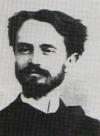Emmanuel Delbousquet poet from France was born on April 27, 1874, had 34 years and died on March 20, 1909. Poems were written mainly in French language. Dominant movement is modernism, realism.
Biography
Emmanuel-Bernard-Philipe Frédéric Delbousquet,[1] French poet and novelist, was born on 27 April 1874 in Sos, Lot-et-Garonne, on the borders of the great Landes de Gascogne and Armagnac, where he died on 20 May 1909.[1]
He devoted his short life to his inner passion to go horse riding, a
subject which naturally became a recurring theme of his works, both in French and Occitan language.
During his short stay in Toulouse in 1891, for the meeting of the group of literature L’Esquile, he founded with Louis Magre and Marc Lafargue the first poetic magazine of the school of Toulouse which appeared in March 1892 and was entiled Les Essais de Jeunes,[1] later becoming L'Effort in March 1896. They asserted their originality by repudiating the romantic ressassement, the decadent and the Symbolists.[2] He also collaborated with La France de Bordeaux, Télégramme de Toulouse, l'A me Latine, la Revue Provinciale, la Revue Méridionale, l’Ermitage, and the Midi Fédéral, a weekly newspaper that had all major southern writers as collaborators, including Laurent Tailhade, Emile Pouvillen, Louis-Xavier de Ricard and Jean Carrère.
Aware of a southern poetry renaissance, the young poet also unites around him the enthusiasm of Joseph Bosc, Jean Viollis, Maurice Magre. Back in Sos, he tried an autobiographical novel entitled Le Reflet, written in 1901, but at the last moment he refused to publish this work considered too clumsy and bombastic. Preferring to translate his land, he developed a script under a more colorful and impressionistic palette. Mindful about realism, his hardworking efforts to recover occitan as language of origin and remembrance, under the leadership of his friend and master Antonin Perbosc, he intersperses his romantic work with gascon terms and expressions. However, it was necessary to wait for the posthumous publication of his collection of poems entitled Capbat Lana by Antonin Perbosc in 1924, for one to see the birth of the félibre Delbousquet.






